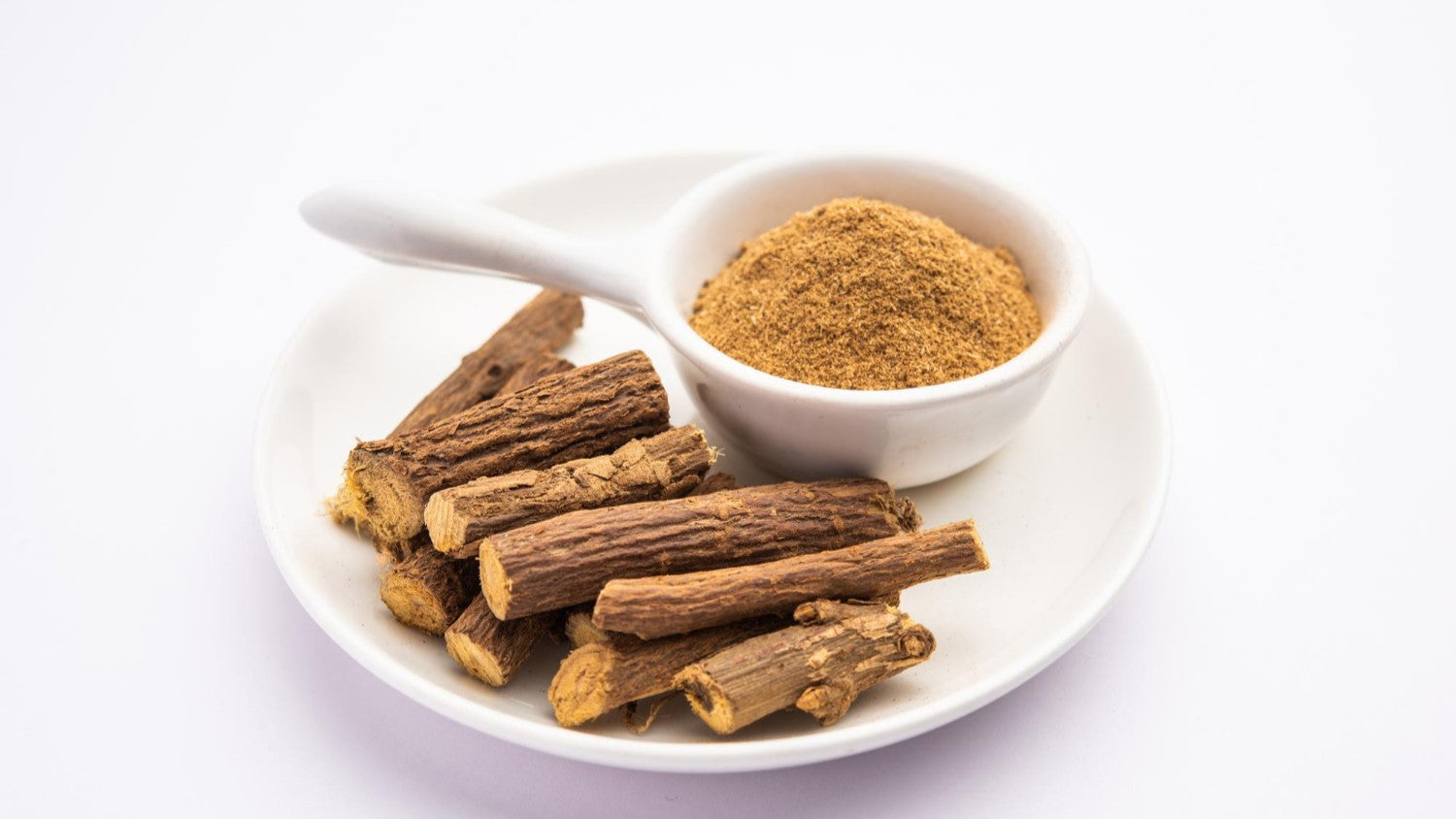WELCOME TO OUR STORE
The Benefits and Importance of Licorice in Ayurveda

Introduction
Licorice, often referred to as the "sweet root," is a cherished herb in Ayurveda known for its soothing and healing properties. This versatile herb has been used for centuries to support respiratory health, digestion, and overall well-being. But what makes licorice such a vital herb in Ayurveda? Let's explore its significance and myriad benefits.
Understanding Licorice
What is Licorice?
Licorice is a perennial herb that grows in various regions across the world. It is known for its sweet-tasting root, which is used in both culinary and medicinal applications.
Scientific Name and Family
The scientific name of licorice is Glycyrrhiza Glabra, and it belongs to the Fabaceae family.
Active Compounds
The primary active compounds in licorice are glycyrrhizin and flavonoids, which are responsible for its sweet taste and medicinal properties.
Names of Licorice in Different Languages
Sanskrit - Yashtimadhu.
Hindi - Mulethi
Tamil - Athimadhuram
Marathi – Jeshtamadha
Telugu - Yashtimadhukam/Atimadhuranu
Bengali - Jaishbomodhu/Jasthimadh
Historical Significance of Licorice
Ancient Uses in India
Licorice has been used in India for thousands of years to soothe coughs, treat digestive issues, and promote overall health.
Licorice in Ayurveda Texts
Ayurvedic texts like Charaka Samhita and Sushruta Samhita extensively mention licorice for its therapeutic benefits and soothing properties.
Ayurvedic Properties of Licorice
Dosha Balancing
Licorice is known to balance Vata and Pitta doshas, promoting harmony and health in the body.
Rasa (Taste) : Sweet taste.
Virya (Potency) : Cooling
Vipaka (Post-Digestive Effect) : Sweet
Health Benefits of Licorice
Respiratory Health
Licorice is renowned for its ability to soothe the respiratory system, making it effective in treating coughs, colds, and bronchitis.
Digestive Health
It supports digestive health by reducing inflammation, soothing the stomach lining, and promoting regular bowel movements.
Anti-inflammatory Properties
Licorice has powerful anti-inflammatory properties that can help reduce inflammation in the body and promote healing.
Skin Health
Licorice is beneficial for the skin, helping to treat conditions like eczema and psoriasis and promoting a clear complexion.
Licorice in Traditional Ayurvedic Remedies
Licorice Tea
Licorice tea is a traditional remedy used to soothe the throat and support respiratory health.
Licorice Churna (Powder)
Licorice powder is often mixed with honey or warm water to create a soothing tonic for various health benefits.
Licorice Oil
Used for massages, licorice oil helps relieve inflammation and promote skin health.
Modern Applications of Licorice
Licorice Supplements
Available in capsule, tablet, and powder forms, licorice supplements are widely used for their health benefits.
Licorice in Skincare Products
Modern skincare products incorporate licorice for its anti-inflammatory and brightening properties.
Culinary Uses
Licorice can be added to teas, desserts, and various dishes to enhance flavor and nutritional value.
Licorice in Research and Science
Studies on Glycyrrhizin
Numerous studies have shown that glycyrrhizin has anti-inflammatory, antiviral, and antioxidant properties.
Clinical Trials
Ongoing clinical trials continue to explore the therapeutic potential of licorice in various health conditions.
Integrating Licorice into Daily Life
Dietary Tips
Incorporate licorice into your diet by adding its powder to teas, smoothies, and other recipes.
Recipes
Try recipes like licorice tea, licorice-infused desserts, and health tonics to enjoy its benefits.
Precautions and Dosage
While licorice is generally safe, it’s important to consume it in moderation. High doses can cause high blood pressure and other side effects.
Licorice and Modern Medicine
Comparisons with Pharmaceutical Drugs
Licorice offers a natural alternative to pharmaceutical drugs with fewer side effects and a long history of safe use.
Potential Drug Interactions
Consult with a healthcare provider before using licorice supplements, especially if you are on medication, as it can interact with certain drugs.
Cultivation and Harvesting of Licorice
Growing Conditions
Licorice thrives in well-drained soil with plenty of sunlight and moderate rainfall.
Harvesting Techniques
Harvesting licorice involves carefully digging up the roots once the plant matures.
Sustainable Practices
Sustainable farming practices are crucial for maintaining soil health and ensuring the quality of licorice.
Conclusion
Licorice is more than just a sweet treat; it is a powerful medicinal herb with a rich history in Ayurveda. Its numerous health benefits and applications make it a valuable addition to any wellness regimen. Embracing licorice in daily life can lead to improved respiratory health, digestive health, and overall well-being
